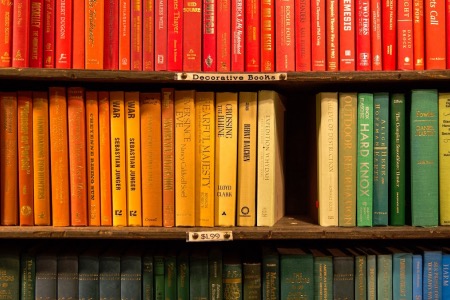The activities of building, maintaining, curating, and providing access to collections, mostly of books but many other sorts of things as well, is a core activity of libraries. The politics of these activities, although generally non-controversial, has recently become a lightning rod. Whether identifying as librarians, archivists, curators, or something else, many of us devote our work and passions to these activities, and many have received intensive, specialist, and technical training about how to develop collections, organize them, make them discoverable, and to share the ideas and usefulness of the knowledge and information that we believe comes from or is contained in these collections. Librarians, for example, not only collect and organize books, most are fierce advocates for freedoms of expression and the right to learn. This has been clearly stated and articulated by the American Library Association’s “Freedom to Read” statement, which was first issued in 1953, which among other things expresses “the responsibility of publishers and librarians, as guardians of the people’s freedom to read, to contest encroachments upon that freedom by individuals or groups seeking to impose their own standards or tastes upon the community at large; and by the government whenever it seeks to reduce or deny public access to public information.”
While many recent attempts to control library collection priorities have focused on the control of social and cultural narratives, there is another threat to library collections: the refusal to admit that a library should ever get rid of a book! Let’s call it “book fever.” This is the sort of thing that possesses a woman in a small Ontario city to get more and more (and more!) books even though she has no space to store them. As the CBC reported in January 2022, it sounds like a bookseller gone obsessive: she owns a book store but now “has a barn and two other farmhouses on the same property full of donated” books. That might not be a problem were there some use for these books, yet “The books are essentially in deep storage, inaccessible to customers and unsearchable by the bookstore’s three-person staff since most of them aren’t catalogued.” She calls it a “tsunami of books” and says she has “no place to store them.” Yet it appears she can’t stop accepting books from the local Salvation Army, which receives hundreds of books a week.
While clearly these books are of no interest to their previous owners, there doesn’t seem to be an indication that there is demand elsewhere. Is this like food waste, where there inefficient distribution and overproduction lead to thousands of pounds of waste every year yet many people still don’t have enough food? You see, books are things but ideas aren’t quite the same as things: there is a zero sum aspect of things - you either have a thing or you don’t, and if you give it to someone else, they have the thing - ideas, on the other hand, can be shared but simultaneously kept. I suspect that what these book hoarders want is to share knowledge, but they’re confusing that with the keeping of books.
A few librarians slid into this conversation on twitter. Mary Cavanagh pointed out that while one of Ranganathan’s laws may be “to every book its reader,” that doesn’t mean mindless hoarding; instead, recycling and deaccessioning unused books is “ethical, necessary, and practical.”
While 1st Ranganathan rule may be, ‘to every book a reader,’ 2nd rule of librarianship is that recycling old unwanted books is ethical, necessary, and practical. To the bin. https://t.co/lbrKbyCRs7
— Mary Cavanagh (@mfcavanagh) January 16, 2022
Another, David Kemper, tweeted that such hoarding is a “disservice” and one respondent pointed out that some of these books came from public libraries where presumably people “won’t even borrow [them] literally for free.”
Agreed. I see some public library stickers on one book there, so there are books that people won't even borrow literally for free. I challenge anyone to detect even one book that is worth reading in those pictures.
— Ryan Deschamps (@RyanDeschamps) January 19, 2022
Another library perspective noted “Books are not inherently sacred. . . . Weeding collections is a good thing.”
Apparently it needs to be said again. Books are not inherently sacred. Books have a lifespan. Recycling books is not a bad thing. Weeding collections is a good thing. Books are not inherently sacred. Stop acting like they are. https://t.co/QQ5Mo4cjLo
— Natalie (@InkyLibrarian) January 16, 2022
Presumably, should someone show up at these aforementioned barns and want to take one of the books, the hoarder should be happy, right? But it doesn’t seem like anyone is stampeding to the place. Captain Obvious on twitter suggested a free warehouse, which was duly laughed off the stage.
LOL! OK, OK, I give up, librarians. It's Monday morning and I have no time to fight for the idea of a free warehouse of cast-off books. I get it: you know all about this problem, etc., and you don't have money to solve it, etc.
— Captain Obvious (@lsanger) January 17, 2022
I don't have time to engage further. I'm done.
(By the way, did you mean a public library, where we share the costs of maintaining the collection so more of us can use the things and, more importantly, find what we’re looking for, not some random castoffs?)
The problem is real. In December, Karen Heller wrote about Fran Lebowitz’s collection of books in The Washington Post. Heller noted Wonder Books, a warehouse of 6 million books in Frederick, Maryland, that continues to receive 300,000 volumes every month. The books are in literal piles and bins. Like the Canadian book tsunami, these American’s were “drowning in old books.” It may be that nobody likes to throw away a book, but there remain a lot of books out there that aren’t very good. Huge runs of hardbacks are published and immediately on sale in big box stores, where most will go unread. But there’s a lot of things that just might benefit from a reconsideration. The Awful Library Books site, with the tagline “Hoarding is not collection development!”, has many to choose from. For example, unless you’re a collection devoted to the history of book organization and cataloging (there are collections that are!), you should not ask your high school library to retain a copy of the ALA Rules for Filing Catalog Cards from 1942, unless you’re preparing your kids for a career in WWII-era libraries. This might be a good reference point for the students in my “Introduction to the Organization of Information” class who need to know about the history of the profession, but probably not a lot of others. There are plenty of institutions that do have a copy of this, that have the resources to keep it, and it’s not doing anyone any good hanging out lost in their barn!
Book hoarders may have overlooked Ranganathan’s first law, which is: books are for use.
Whether you call it tsundoku, bibliomania, or just plain book fever, the activity of collecting and storing books is clearly a human passion. But when it gets too focused on the possession of books qua books, we have lost focus on the reason that we make libraries: to promote knowledge, learning, and community engagement.
Unrelated Mini-Playlist
An unfortunately missed previous libraries playlist could’ve focused on the “cheese slice bookmark” tweets, which were in high circulation around January 2020 when the University of Liverpool Library tweeted a photo of a packaged cheese slice found stuffed between the pages of a returned book. It was covered by Know Your Meme, though it’s now under review (presumably for being too “niche”?).



Comments